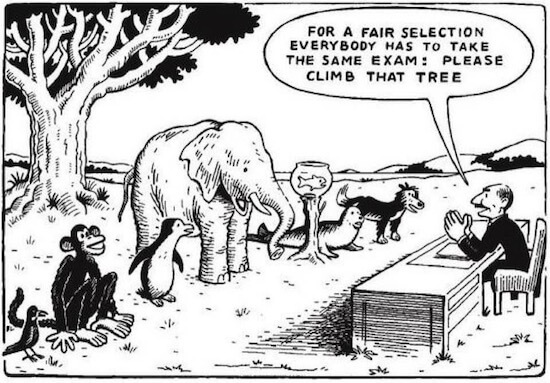
Everybody is a Genius. But If You Judge a Fish by Its Ability to Climb a Tree, It Will Live Its Whole Life Believing that It is Stupid
This allegory, so well illustrated by the image here, is rooted in questioning orthodoxy in educational theory.
In Cayman, one of the very best teachers my sons ever had at high school was Nicola Sowerby. She has always seen and nurtured the whole person, and years ago, though it was an excellent school, she chose to leave the mainstream and set up her own school. The name of the school says it all, CleverFish. As you do in Cayman, I bumped into her recently in a store in Cayman and she remarked that demand for her school is seemingly limitless.
Why the limitless demand? Simple, it is now internationally recognised that approaching 40% of all school students have learning needs outside the norm, so 40% are fish being taught to climb trees. FORTY PERCENT! Now consider society. Public education systems are already under great strain, so they cannot possibly meet all those learning needs, so it is left to private schools such as Cleverfish to help. This excludes the vast majority of those “Fish” who deeply need to have their unique abilities recognised.
For the business leaders reading this, how might you help both your business and society? I have some ideas, so please read one.
First, please recognise that the corporate world is largely designed similarly to traditional education, it measures everyone by the same standards. Imagine what is being missed at all levels in your company by not deeply learning and growing your awareness around the power of neurodiversity so as to add to your business commercially. (To give some more depth to this, first please read an earlier post: “Want great long-term returns? Invest in being Diverse by Design“)
So, today I give you two commercial opportunities as ideas for you to then get thinking about how you can benefit from investing in understanding neurodiversity, then a final thought as to how larger companies can learn more about neurodiversity so as then to better identify commercial opportunities from that.
Focussed, repetitive work as work certain people love
First, this week I heard of a global investment bank that struggled to hire and then retain staff to do the vital but repetitive and boring work of “marking to market” their trading on a daily basis. Ultimately they recognised the strengths and needs of some of the “Fish” on parts of the autism spectrum and hired and built a team of people, who had strengths in loving routine, repetition, focussed work. They also needed some adjustments to their working environment (quiet, lower lighting, no disturbances). Once established, this team was 130% more productive and also had far higher retention. I could go into more detail, but any specialist in neurodiversity reading this will be saying to themselves “Of course that would happen for that type of work!”, so if you weren’t saying “of course” then perhaps talk to a specialist and identify where you could benefit through understanding neurodiversity then joining the dots to opportunities in your organisation.
How can Leaders get in the Zone for Deep Focus?
Second, now look towards the most senior leadership levels in your organisation. In “time blindness and the power of presence” I wrote:
As I put it to CEOs often, “the less you do the more valuable you are to your business”.
Now imagine a neurodiverse person. “Everyone with ADHD knows that they can “get in the zone” at least four or five times a day.” William Dodson, MD
With all the many leaders I have worked with, I would estimate that they get in the “zone” once per week if they are lucky (or consciously plan that space). By the zone, I think of getting into a space of deep focus where they are in the “now”, fully present, unaware of time, simply in the “flow”.
Imagine if, instead, we could get into the zone four or five times per day, what would be possible in terms of that leader focussing on the truly important?
In short, what if your organisation had more ADHD people in your leadership team, imagine the focus they could bring to high-value strategic thinking for you.
Partner with charities and then schools
There are multiple forms of neurodiversity, each with its own charitable organisations seeking to promote awareness as well as support those with that form of identified difference from the neurotypical. For example. around one quarter (10% of that 40%) of those with different educational needs are those with dyslexia. Story after story abounds around how dyslexics can and have been tremendously successful in business and as leaders, yet society and the business world as a whole still have barely touched the tip of the iceberg of possibilities here! What if, however, your company, with a context of helping both society and your business, reached out to a relevant charity and talked to them about you funding an educational programme within existing schools to support students where their budgets cannot reach? You could both help students and their schools whilst learning so much about neurodiversity through that partnership.
